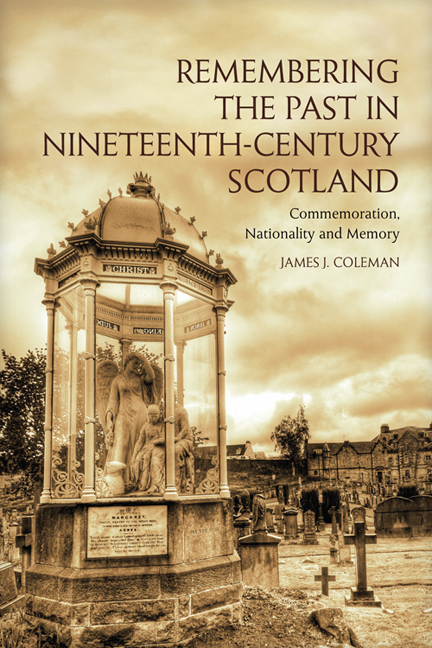Book contents
- Frontmatter
- Contents
- Acknowledgements
- Introduction: The Valley Cemetery
- 1 Nationality, Memory and Commemoration
- 2 Scottish Nationality in the Nineteenth Century
- 3 ‘Not Servile and Conquered, but Free and Independent’: Commemorating William Wallace and Robert the Bruce
- 4 ‘The Highest Position in the Civilised World’: Commemorating John Knox and the Second Reformation
- 5 ‘If They Were Rebels Then, We Are Rebels Now’: Commemorating the Covenanters and the Glorious Revolution
- 6 ‘By the Imprudence of His Ancestors’: Commemorating Jacobitism and Mary Queen of Scots
- 7 ‘Staunch Loyalty to the Flag that Stands for Union’
- Bibliography
- Index
3 - ‘Not Servile and Conquered, but Free and Independent’: Commemorating William Wallace and Robert the Bruce
Published online by Cambridge University Press: 05 August 2016
- Frontmatter
- Contents
- Acknowledgements
- Introduction: The Valley Cemetery
- 1 Nationality, Memory and Commemoration
- 2 Scottish Nationality in the Nineteenth Century
- 3 ‘Not Servile and Conquered, but Free and Independent’: Commemorating William Wallace and Robert the Bruce
- 4 ‘The Highest Position in the Civilised World’: Commemorating John Knox and the Second Reformation
- 5 ‘If They Were Rebels Then, We Are Rebels Now’: Commemorating the Covenanters and the Glorious Revolution
- 6 ‘By the Imprudence of His Ancestors’: Commemorating Jacobitism and Mary Queen of Scots
- 7 ‘Staunch Loyalty to the Flag that Stands for Union’
- Bibliography
- Index
Summary
THE GREAT LIBERATOR
William Wallace is one of Scotland's most enduring national heroes. Since the 1470s and the first appearance of Blind Harry's epic poem, The Actes and Deidis of the Illustre and Vallyeant Campioun Schir William Wallace, Wallace has occupied a central place in the collective memory of the Scots, a position he continues to hold, thanks in part to the enormous success of the 1995 film Braveheart. One of the reasons for Wallace's enduring appeal is the simplicity of his story. Born as a commoner, urged on by his love of liberty and need to free Scotland from the chains and slavery of an oppressive neighbour, Wallace rose through the ranks of society to become Guardian of Scotland. He went on to lead the Scots to victory over the armies of the tyrannical English king, Edward I, at Stirling Bridge. Whilst attempting to place Scotland's hard-fought independence on a more secure footing, Wallace was defeated, betrayed, and taken to London for trial and execution. In essence, this was the hero's journey: from relatively lowly stock to victory, martyrdom, and permanent, illustrious memory.
The principal reason for Wallace's endurance as a national symbol is not, however, the simplicity of his life story. It is instead the malleability of his achievements and character that make Wallace such an ideal hero. At heart, Wallace is the embodiment of personal liberty and national independence, virtues so flexible that he could be deployed for practically any purpose: Radical Wallace, Chartist Wallace, Free Trade Wallace; Unionist Wallace, Nationalist Wallace or Unionist-nationalist Wallace; Jacobite Wallace or Presbyterian Wallace. This flexibility is borne of an absence of historical fact. So little was and is known about the Great Liberator that any cause could make use of his memory without much fear of prickly historical detail bursting the mythic bubble.
At the same time, there was sufficient hard evidence of Wallace's existence to make him a genuine, historical reality. Wallace was no mere myth but a man whose living existence could be historiographically proven. What facts there were sustained his idealisation. For instance, Wallace being of relatively common stock, in his rise to greatness he did not suffer from the taint of noble privilege.
- Type
- Chapter
- Information
- Remembering the Past in Nineteenth-Century ScotlandCommemoration, Nationality, and Memory, pp. 39 - 87Publisher: Edinburgh University PressPrint publication year: 2014



